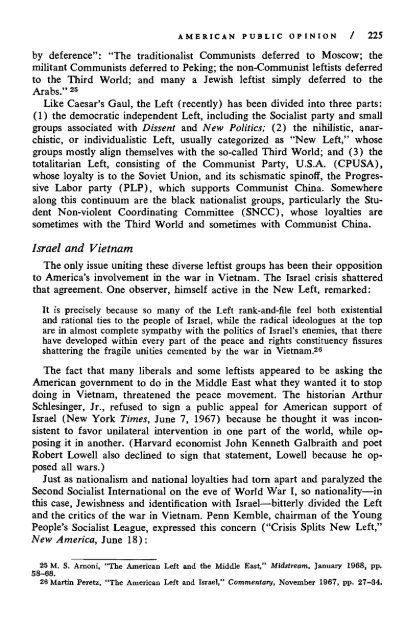1968_4_arabisraelwar
Create successful ePaper yourself
Turn your PDF publications into a flip-book with our unique Google optimized e-Paper software.
AMERICAN PUBLIC OPINION / 225<br />
by deference": "The traditionalist Communists deferred to Moscow; the<br />
militant Communists deferred to Peking; the non-Communist leftists deferred<br />
to the Third World; and many a Jewish leftist simply deferred to the<br />
Arabs." 25<br />
Like Caesar's Gaul, the Left (recently) has been divided into three parts:<br />
(1) the democratic independent Left, including the Socialist party and small<br />
groups associated with Dissent and New Politics; (2) the nihilistic, anarchistic,<br />
or individualistic Left, usually categorized as "New Left," whose<br />
groups mostly align themselves with the so-called Third World; and (3) the<br />
totalitarian Left, consisting of the Communist Party, U.S.A. (CPUSA),<br />
whose loyalty is to the Soviet Union, and its schismatic spinoff, the Progressive<br />
Labor party (PLP), which supports Communist China. Somewhere<br />
along this continuum are the black nationalist groups, particularly the Student<br />
Non-violent Coordinating Committee (SNCC), whose loyalties are<br />
sometimes with the Third World and sometimes with Communist China.<br />
Israel and Vietnam<br />
The only issue uniting these diverse leftist groups has been their opposition<br />
to America's involvement in the war in Vietnam. The Israel crisis shattered<br />
that agreement. One observer, himself active in the New Left, remarked:<br />
It is precisely because so many of the Left rank-and-file feel both existential<br />
and rational ties to the people of Israel, while the radical ideologues at the top<br />
are in almost complete sympathy with the politics of Israel's enemies, that there<br />
have developed within every part of the peace and rights constituency fissures<br />
shattering the fragile unities cemented by the war in Vietnam. 26<br />
The fact that many liberals and some leftists appeared to be asking the<br />
American government to do in the Middle East what they wanted it to stop<br />
doing in Vietnam, threatened the peace movement. The historian Arthur<br />
Schlesinger, Jr., refused to sign a public appeal for American support of<br />
Israel (New York Times, June 7, 1967) because he thought it was inconsistent<br />
to favor unilateral intervention in one part of the world, while opposing<br />
it in another. (Harvard economist John Kenneth Galbraith and poet<br />
Robert Lowell also declined to sign that statement, Lowell because he opposed<br />
all wars.)<br />
Just as nationalism and national loyalties had torn apart and paralyzed the<br />
Second Socialist International on the eve of World War I, so nationality—in<br />
this case, Jewishness and identification with Israel—bitterly divided the Left<br />
and the critics of the war in Vietnam. Penn Kemble, chairman of the Young<br />
People's Socialist League, expressed this concern ("Crisis Splits New Left,"<br />
New America, June 18):<br />
25 M. S. Amoni, "The American Left and the Middle East," Midstream, January <strong>1968</strong>, pp.<br />
58-68.<br />
26 Martin Peretz, "The American Left and Israel," Commentary, November 1967, pp. 27-34.


